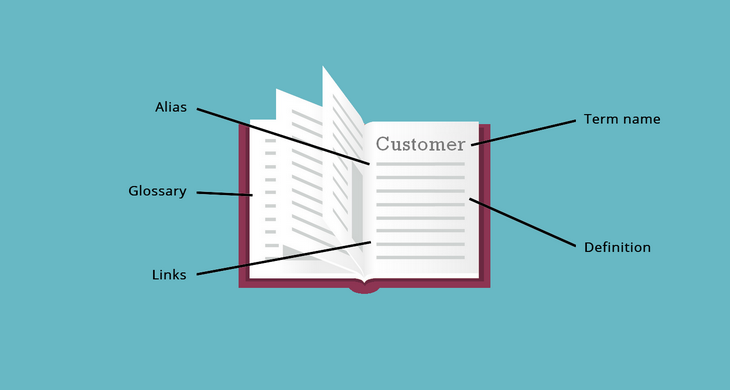A business glossary is a compilation of unique business terms that are clearly defined, along with other useful attributes. The core purpose of this glossary is to serve as a reference guide that provides employees with common verbiage used in a business. This alleviates wasted time, misunderstanding, and unpleasant surprises.
It is quite common for organizations to start the process of adding common terms to a spreadsheet, but without definitions, examples, and pertinent information such as how the terms relate to one another, as well as processes, reports, databases and systems, and data owners and stewards, this kind of business glossary simply doesn’t serve as a useful tool.
Oftentimes, employees never take the time to reference the sheet due to poor organization or a lack of information, and teams sometimes stop adding to it all together. However, having a business glossary to act as a unique collection of terms is vital processes.
A business glossary works to ensure that the correct terms are used in the proper context. This helps to prevent incorrect information on reports and it can even help teams avoid miscalculations and erroneous data analytics results. As an example, a proper business glossary will help to provide instructions on creating a report so employees know exactly how to determine the metrics of their “customer retention rate.”
Without a business glossary, simple misunderstandings can result in big errors. For instance, the terms “customer” and “client” are often used interchangeably, but that is not the case in all organizations. Of course, both refer to an individual making a purchase, but for some organizations, a “client” is someone who seeks professional services from a business whereas a “customer” buys goods or services from a business.
With that example in mind, it’s easy to see that understanding the language within a company will enable consistent and better communication for everyone involved. Below are seven benefits of having a business glossary:
1. Improves Communication Between IT and Business
A business glossary provides a list of terms that are important to a specific business. The glossary should be unique in its terms and definitions to ensure its completeness and accuracy. Through listing the definitions, examples, synonyms, and so on of specific terms, individuals throughout various departments of a business will be able to communicate without issue.
A business glossary will prove especially beneficial when dealing with communication between IT personnel and customer service, or web developers and a sales manager. A glossary will help ensure all team members are on the same page without employees having to repeatedly explain terms to one another and draw out different versions of a definition. The glossary keeps definitions consistent and puts them in an easy-to-reference location, saving everyone time. Moreover, when a dedicated tool is used to capture the business terms, such as Dataedo, it is often linked to a data dictionary and this helps IT better connect the business metadata to the technical metadata.
2. Promotes Understanding
As mentioned previously, terms are sometimes used interchangeably or differently from one business to the next, such as with the example of “customer” and “client.” Varied terms and usages will be identified in a business glossary and will essentially help to improve understanding within a business.
Having core concepts in a business glossary, like “monthly sales,” along with the definition of a “sale” itself, the “beginning” and “end” of a month, and sales categorized by “region” will prevent confusion and result in more useful, accurate reports. Let’s not even mention getting consensus on the meaning of “bi-weekly”. Is it every two weeks or twice a week? Ask two people and you might get two different answers if such an artifact does not exist in the organization.
3. Incorporates Workflow
Whenever a business has multiple departments, it is common for each branch of employees to define their own sect of terminology. However, this can cause disruption and misunderstanding. A business glossary is available and implemented as part of the policies and procedures, it prevents the silo effect and creates an effective form of collective workflow.
4. Enriches Training
A complete business glossary is a useful tool for new and existing employees alike. It offers a more efficient way of providing accurate information that is easily accessible. Also, an in-depth business glossary will offer a comprehensive search feature that not only defines the terminology, but also includes details that promote data control such as analytical KPIs, metadata, and processes.
5. Gives Ownership
An effective business glossary will be routinely updated with new content, which should be verified and approved. Whether the business owner or an appointed individual or third party completes this final check of accuracy, the approval process establishes ownership and safeguards the legitimacy of the information. The beneficial downstream effect is that this ownership often rolls over into business ownership over data quality requirements, data stewardship, process management, and so on, over the same business and data domain.
6. Establishes Trust
A business glossary reduces the likelihood of terms being misunderstood or improperly used, which often results in incorrect data reports and dashboards. For instance, a report developer may compile information and run multiple tests based on his/ her understanding of certain terms. With pride the developer presents the report to the end user, who complains about it.
Perhaps the developer missed an error in the conversion, calculation, or testing of data. On the other hand a mix-up between the developer and end user may have transpired, due to lack of proper term usage. And even after the mix-up is cleared up, it is bound to happen again. This is a common mishap when an organization does not have a business glossary in place.
7. Increases Efficiency
When all team members understand the terms and definitions of the business glossary, they are better equipped to make informed decisions, and complete tasks with confidence, which increases overall productivity.
Conversely, when all parties involved have easy access to the business glossary, as well as a mutual understanding of the terms and how they correlate with various data points and metrics, it reduces errors and delays on how data should be transformed into information.
Summary
By creating a business glossary and establishing it as an integral part of an organization’s policies and procedures, it promotes collaboration across multiple departments, offers data transparency, and ensures that your data and business verbiage is accurate and understood. Therefore, regardless of an employee’s previous experiences, understandings, usage, and training, a business glossary will give clarity for your organization.











 George Firican
George Firican



